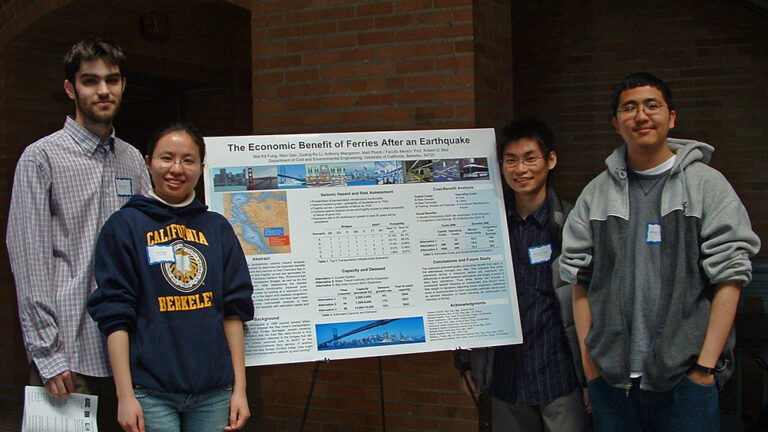
EECS Bachelor of Science
There are many reasons why the EECS B.S. is ranked among the top three undergraduate computer engineering programs in the world. We offer a dynamic, interdisciplinary, hands-on education; we challenge conventional thinking and value creativity and imagination; and our students and faculty are driven by social commitment to change the world.
Ingenuity, Design, and Real-Life Applications
You are about to enter on one of the greatest adventures of your life: selecting the school where you will pursue your college degree. If you have a record of outstanding academic achievement and you enjoy science, mathematics, problem solving, and design, we hope you will seriously consider applying to the University of California, Berkeley’s Electrical Engineering and Computer Sciences (EECS) Department.
Engineering is about the application of technology to solve societal needs. Electrical engineers and computer scientists are the people responsible for designing the systems and components that capture, store, process, interpret, and transmit information or signals. Some of the most significant technological advances of the 20th century were either invented or put into practice by electrical engineers and computer scientists, including electric power systems; global broadcast and personal telecommunication systems; computer systems; computer networks; medical instrumentation, such as magnetic resonance imaging (MRI) and computer-aided tomography (CAT); integrated circuits; lasers; household appliances; and feedback control, such as for autopilots. New technologies developed by electrical engineers and computer scientists are likely to be even more important in the 21st century as a new era of intelligent, information-driven systems is made possible by fundamental advances in faster communication rates, smaller devices, and greater computational capabilities.
Ways to Explore Berkeley EECS
- Participate in workshops, presentations, demonstrations, and lab tours at Cal Day, our annual open house held each April.
- Schedule an appointment with an EECS Department Adviser.
- Register for a department tour, led by members of Eta Kappa Nu, the EECS Honor Society.
- Attend programs hosted by Science@Cal, an organization created to connect the community with UC Berkeley scientists and research.
- Learn more about Berkeley Engineering on YouTube.
- Check out “The Beauty and Joy of Computing,” a free online course taught by UC Berkeley Professor Dan Garcia.
Applications
Students interested in EECS should apply directly to the major on the University of California Application for Admission. The holistic review process evaluates the applicant’s full spectrum of qualifications viewed in the context of their academic and personal circumstances.
Once enrolled, students may choose to pursue a joint major, double major, simultaneous degree, or minor.
Freshman Admission
Freshmen are admitted directly into the EECS major and spend all four years in the program. In addition to the UC Admission requirements, engineering applicants are encouraged to take additional courses, particularly in math and science. Doing well in these subjects will prepare new students for the rigors of engineering at the university level.
Freshmen applicants may also consider applying to the College of Engineering as Engineering Undeclared.
Transfer Admission
You are a transfer student if you have completed coursework during a regular session at a college or university after high school. Transfer applicants must complete all required preparation courses to be eligible for admission.
Please note that UC Berkeley gives California community college students first priority over other transfer applicants. These students should use assist.org to ensure admission requirements are completed and transferrable.
Transferring from a CA Community College
Transferring from Another Institution
EECS B.S. Degree Requirements
Students are required to complete core technical classes during their first few semesters. They then have the opportunity to explore various topics from computer science theory to networking and physical systems.
Transferring within Cal? Pursuing a Double Major?
It is rare but possible to transfer into the EECS program from another major on campus or to add EECS as a second major. We also offer an EECS minor, a CS Minor, and an EIS Minor for students pursuing other majors.

EECS + Business Simultaneous Degrees
In just four years you can earn two B.S. degrees through the Management, Entrepreneurship, & Technology (M.E.T.) Program in EECS and Business Administration. You’ll be in a small cohort, benefiting from close mentoring, a tight-knit community and opportunities to connect everything you’re learning in one integrated experience.

Undergraduate Research
A self-initiated research project allows you to graduate with something that represents the distillation of your interests and studies, and possibly, a real contribution to knowledge.